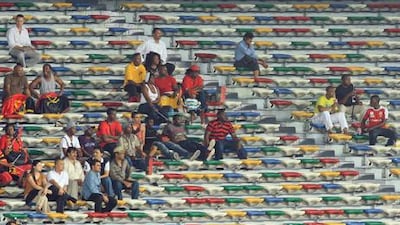You might bemoan the imperfections of playing before roughly 500 in a stadium that seats 49,500 - and Srecko Katanec, the UAE manager, reasonably did so on Tuesday night - but you must give the event its due as unique and maybe even unforgettable. Not many people can claim such an experience as a UAE-Angola friendly that did have its peculiar fascination. Of all the stadiums in all the capitals on a Fifa night on Earth, maybe none could match it for showing that gazing at empty section upon empty section can prove strangely hypnotic.
It is something to say you have done, and it might even count as futuristic. For decades, wiseacres have foretold a day when people simply would stop going to stadiums and would remain home in living rooms accruing fat grammes from processed food extracted from plastic bags while watching televisions so colossal as to be visible from Jupiter and possibly Saturn. Just last month the National Football League got going again in the United States, and so did a mild hand-wringing over the lack of sell-outs in some stadiums.
This presents problems because of the NFL's television rule that blacks out markets that dare not sell out, but a question did arise: why would people in a moribund economy spend money to occupy galling traffic when they could sit home and watch stunning visuals on humongous screens with multiple replays from multiple angles? The stunning visual at Zayed Sports City on Tuesday night, of course, involved yawning vacancy, a sweeping solitude that lent further credit to the UAE's football accomplishments reaped amid zero zeal. At one point, an empty section behind one goal did seem to have lured a smallish crowd.
It turned out to be security men, breaking for some football. Yet if Angola's 2-0 win had its dreariness, coming home and watching the news reinforced the idea that somewhere in a turbulent world there is always greater dreariness. On the wide spectrum of Tuesday night alone, there were far worse stadiums to occupy, and that does not include Wembley where England's goalless draw with Montenegro wreaked jeering that was undoubtedly creative.
No, far worse to have been in Genoa, Italy, where the maddeningly fleeting nature of football found another quintessence, and where the only people who could have enjoyed the night were connoisseurs of riot police. Security men and police officers for the Italy-Serbia Euro 2012 qualifier never got a chance to take in any football, partly because only six minutes of football transpired before officials abandoned the match, and partly because they spent the evening clashing with Serbian hooligans.
The latest ugliness of the kind that England trumped over time loosed headlines about "17 detained" and "16 hospitalised" and, from an Italian newspaper, "Beasts". Fans attacked the Serbia team bus and launched flares on to the pitch, one nearing Emiliano Viviano, the Italy goalkeeper. They clearly aimed to disrupt. This called to mind that just 367 days prior, Serbian fans danced all night in Belgrade. Car horns honked. The president opened celebratory champagne at Red Star Belgrade Stadium, and the police cited the president for violating the anti-hooligan alcohol law.
Serbia had just trounced Romania 5-0 and qualified for the World Cup atop a group that included France, which seemed a feat at the time. Hooliganism still lurked heavily, but hope abounded. Players rejoiced in Serbia winning "under its true name" for the first time. Radomir Antic, the popular and seasoned manager, said: "If we continue like this in South Africa, we will be a power to reckon with at the World Cup."
They very well might have been. Stuck in a group with Ghana, Germany and Australia, and even beating Germany, they would have made the knockout stage but for a 2-1 defeat to Australia on the usual thin array of what-ifs - two offside calls, that unseen handball - that sent Antic wailing about the referee's "black day against Serbia". Things careened from there to Antic's termination in September plus a horrid 3-1 home loss to Estonia. Now Serbia leads only Faroe Islands in Group C and awaits Uefa's ruling on whether the abandonment might count as a loss or cause disqualification from the entire event.
The all-time most-capped Serbian player, Savo Milosevic, went on Serbian media to peg it "one of the darkest days in Serbian football history", calling for England-style reforms. Various officials viewed it as beyond football, an outright attack on the Serbian state. It's all terrible, and while there are many stadium experiences between extreme apathy and extreme antipathy, just thinking of Genoa made Abu Dhabi seem sanguine.
Bored security beats burdened security any day. cculpepper@thenational.ae

